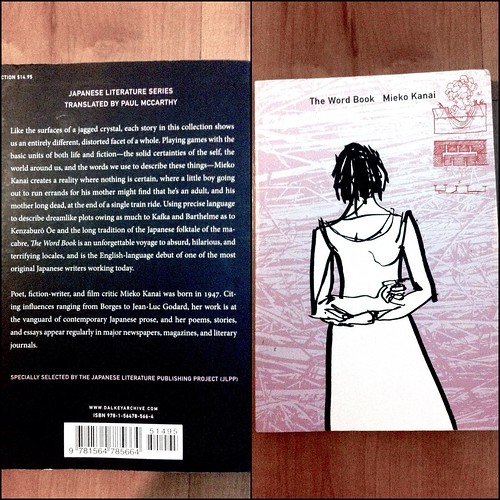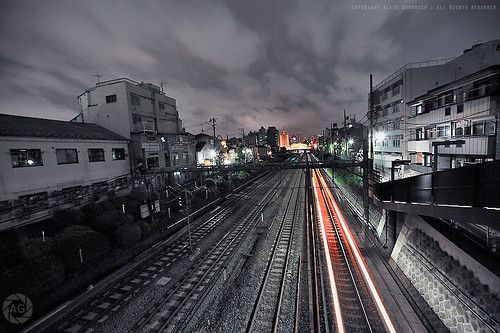You might not have heard of the Japanese writer Mieko Kanai (金井美恵子), but she wrote the short story "The Moon" that inspired my short film "LAST FRAGMENTS OF WINTER".
I stumbled upon her works by accident. It was September 2010. My uncle (father's younger brother) passed away suddenly, my parents, who were in Tokyo with me for my graduation ceremony, had to fly back to Malaysia immediately.
I was left alone in the hotel that my parents were supposed to stay for a few more days. Overwhelmed by solitude, I went to my favourite Aoyama Book Center in Roppongi, hoping to distract my mind with literature.
Going through the shelf, "THE WORD BOOK" by Mieko Kanai, a collection of her short stories, caught my eye. Maybe it was the cover. THE WORD BOOK came out in the 70s, but it only just got translated into English that year.

I flipped through the book, went through some stories, and found myself captivated by the imagery of her dream-like tales. I didn't buy the book immediately, but her words lingered. (I bought the book a few days later on Amazon)
This is the opening paragraph of "The Moon":
Another one:
And finally:
The story shifted from the point of view of a child, and then to an adult, I wasn't sure whether it was the same person, or whether it was told from the perspective of the child and his father.
A few months later, I made LAST FRAGMENTS OF WINTER, because I needed to get these images out of my system. It usually happens this way. (my earlier short films, LOVE SUICIDES and KINGYO, were loose adaptations of Yasunari Kawabata's short stories as well)
Retyping the words from "The Moon", I am mildly surprised by how faithful I had been to the source material.
Two years after that, right now, I became a part of James Lee's HUNGRY GHOST FESTIVAL: 3 DOORS OF HORROR omnibus, I find myself, once again, drawing from the Mieko Kanai pool of inspiration, this time, it's from the short story "The Boundary Line" (also from "THE WORD BOOK"), which revolves around a drowned female corpse. The other two directors, Ng Ken Kin and Leroy Low have finished their segments (Leroy finished his shoot just a few days ago), both will most probably be great, so I'm now preparing for my shoot (scheduled at the end of June). Yesterday, I have secured most of the key cast members for the film. Soon, I will continue revising the script to see what is there to fix. I usually work on my script until during the shoot itself.
Going through the "THE WORD BOOK" again, I realized that another Kanai book "INDIAN SUMMER" had just gotten translated earlier this year. This book review is written by Paul McCarthy (who was the translator of THE WORD BOOK!).
Through this review that I found out Mieko Kanai had been living in Mejiro for decades, the very same area that I've stayed in for the past five years.



The fact that she's in the neighbourhood made me wonder whether this is the reason her works resonated with me.
I stumbled upon her works by accident. It was September 2010. My uncle (father's younger brother) passed away suddenly, my parents, who were in Tokyo with me for my graduation ceremony, had to fly back to Malaysia immediately.
I was left alone in the hotel that my parents were supposed to stay for a few more days. Overwhelmed by solitude, I went to my favourite Aoyama Book Center in Roppongi, hoping to distract my mind with literature.
Going through the shelf, "THE WORD BOOK" by Mieko Kanai, a collection of her short stories, caught my eye. Maybe it was the cover. THE WORD BOOK came out in the 70s, but it only just got translated into English that year.

I flipped through the book, went through some stories, and found myself captivated by the imagery of her dream-like tales. I didn't buy the book immediately, but her words lingered. (I bought the book a few days later on Amazon)
This is the opening paragraph of "The Moon":
According to Mother, I was already old enough to go on errands all by myself, even at night. "The chicken butcher and the green grocer just in front of it, near the castle at the edge of the shopping area, should be open till nine, and I want you to get me a chicken and a package of mushrooms there, I'm sorry you have to go at night like this, but I couldn't say no. "Your older sister" - she had died at age six - "used to take a little wicker basket and go buy the enriched powdered milk she always drank," Father said, laughing good-naturedly; but Mother looked a bit sad. Then I went out into the town, where the last dim twilight had been swallowed up in night."
Another one:
Oddly enough, our accounts of our memories of the dead begin with the arrival of news of a sudden death. When this call comes, we are dazed, left speechless. Those who were close to the dead person may have the impression of things occurring in a dream whose meaning is out of reach. Like words heard in a dream - or rather, in a dream one was trying to recall while only half-awake..
What was sad, in what words? We have no idea. There are only traces of the raw reality of having been informed of something truly frightening. One's very irritation of being unable to recall the significance of words spoken in a dream feels like something that is happening in yet another dream, a nightmare. Thus, confronted with news of a sudden death, they (I) feel vertigo. Then they start to talk about you, who have already turned into a memory - about their memories of you, which are somehow lacking in reality. They emphasize the fact that you are no longer in this world as they speak of you, so the memories all become beautiful, taking on a tragic tone. Even the most boring memories are enveloped, in this place, in deep, tragic shadows.
And finally:
When I got home, I found everything just the way it had been when I left, with Mother lying on a rattan chaise-longue in her usual place in the sitting-room, listlessly reading a book with a russet cover. When she saw my face, she looked a bit angry and said, "Where were you off to, young man? I was afraid you'd been kidnapped and would never come back!" I started to open my mouth to explain what I had seen, but I was in the grip of a melancholic fretfulness and couldn't say a word. Then Father spoke: "You were looking at the moon, weren't you?"
I blinked and just said "Unh" in reply. father took the packages of good, saying, "It'll take thirty minutes to cook the chicken, so go take your bath, you're big enough to wash yourself now, but I'll wash your hair for you."
It was after that Mother died, though I don't know if it was a year after, or a month, or a week, or a day.
The story shifted from the point of view of a child, and then to an adult, I wasn't sure whether it was the same person, or whether it was told from the perspective of the child and his father.
A few months later, I made LAST FRAGMENTS OF WINTER, because I needed to get these images out of my system. It usually happens this way. (my earlier short films, LOVE SUICIDES and KINGYO, were loose adaptations of Yasunari Kawabata's short stories as well)
Retyping the words from "The Moon", I am mildly surprised by how faithful I had been to the source material.
Two years after that, right now, I became a part of James Lee's HUNGRY GHOST FESTIVAL: 3 DOORS OF HORROR omnibus, I find myself, once again, drawing from the Mieko Kanai pool of inspiration, this time, it's from the short story "The Boundary Line" (also from "THE WORD BOOK"), which revolves around a drowned female corpse. The other two directors, Ng Ken Kin and Leroy Low have finished their segments (Leroy finished his shoot just a few days ago), both will most probably be great, so I'm now preparing for my shoot (scheduled at the end of June). Yesterday, I have secured most of the key cast members for the film. Soon, I will continue revising the script to see what is there to fix. I usually work on my script until during the shoot itself.
Going through the "THE WORD BOOK" again, I realized that another Kanai book "INDIAN SUMMER" had just gotten translated earlier this year. This book review is written by Paul McCarthy (who was the translator of THE WORD BOOK!).
Through this review that I found out Mieko Kanai had been living in Mejiro for decades, the very same area that I've stayed in for the past five years.



The fact that she's in the neighbourhood made me wonder whether this is the reason her works resonated with me.